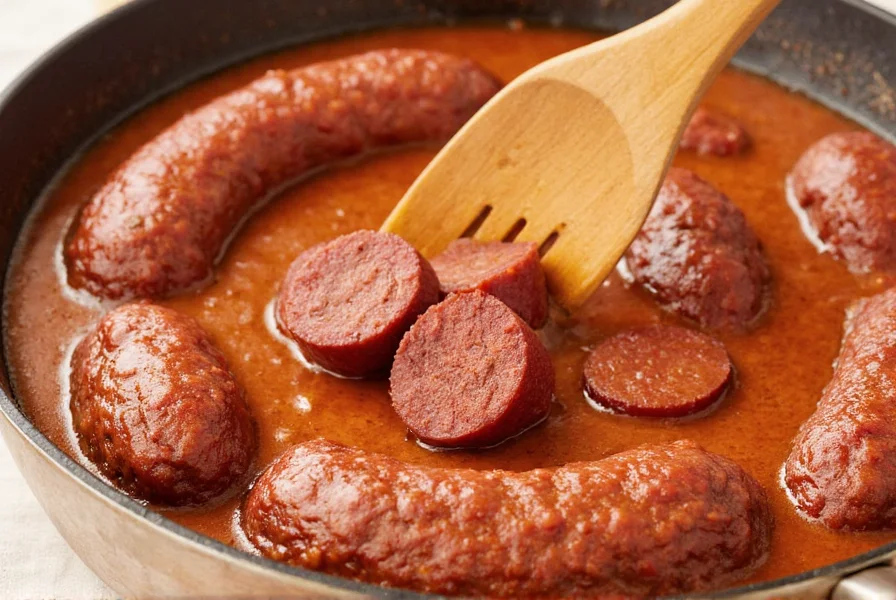Chili chorizo is a spicy, smoky pork sausage popular in Mexican and Latin American cuisine. This comprehensive guide covers everything you need to know about cooking, buying, storing, and pairing chili chorizo for maximum flavor and freshness. Whether you're a beginner or a seasoned cook, you'll find practical tips to elevate your dishes.
Table of Contents

What Exactly Is Chili Chorizo?
Chili chorizo is a spicy variety of chorizo sausage made with chili peppers, smoked paprika (pimentón), garlic, and other spices. Unlike traditional Spanish chorizo (which is cured and can be eaten raw), chili chorizo typically refers to Mexican-style chorizo that is fresh and requires cooking. The "chili" designation indicates a higher heat level from added chili peppers, making it distinct from milder Spanish varieties.
| Type | Texture | Flavor Profile | Cooking Style |
|---|---|---|---|
| Spanish Chorizo | Dense, dry | Smoky, garlicky, slightly sweet | Eaten raw or sliced |
| Mexican Chorizo (Chili Chorizo) | Soft, fatty | Spicy, tangy, meaty | Cooked before use |
Why Chili Chorizo Adds Extra Flavor to Any Dish
The secret behind chili chorizo's addictive flavor lies in its spice blend. The combination of chili peppers, smoked paprika, vinegar, and garlic creates layers of savory, slightly acidic, and umami-rich taste. This versatility makes it perfect for:
- Breakfast scrambles with eggs and potatoes
- Taco fillings with fresh toppings
- Stews and soups for added depth
- Grilled sandwiches with avocado and cheese
- Loaded nachos or pizza toppings

Top 7 Expert Cooking Tips
- Test freshness with the squeeze test. Fresh chili chorizo should feel soft but not slimy. A firm texture indicates good quality.
- Render fat slowly. Cook over medium-low heat to let the fat melt evenly, creating crispy edges without burning.
- Break into small crumbles. For tacos or scrambled eggs, break the sausage into fine pieces while cooking for even flavor distribution.
- Balancing heat is key. Pair with cooling ingredients like avocado, sour cream, or lime crema to balance the spice level.
- Use deglazing techniques. After browning, add orange juice or beer to lift browned bits and create a rich sauce base.
- Use as a flavor base. Simmer in tomato sauces or stews to infuse deep meaty flavor into dishes.
- Try it on pizza. Crumbled chili chorizo with red onion, cilantro, and mozzarella makes a delicious spicy pizza topping.

How to Choose the Best Chili Chorizo
When selecting chili chorizo, focus on these key factors:
| Product Name | Spice Level | Flavor Notes | Best For | Recommended Use |
|---|---|---|---|---|
| Jamonera Mexican Chorizo | 🌶️🌶️🌶️ | Smoky, tangy, bold | Tacos, burritos, scrambles | Fry crumbled for fillings |
| La Flor de Jalisco | 🌶️🌶️ | Balanced heat with herbaceous notes | Families, everyday meals | Stuffed peppers, casseroles |
| Chorifuego Extra Spicy | 🌶️🌶️🌶️🌶️ | Fiery, peppery, intense | Heat lovers, BBQs | Grilled whole or diced in stews |
| El Rey Chorizo | 🌶️ | Mild smokiness with subtle spice | Beginners, mild palate | Sautéed with vegetables |
Key Buying Tips:
- Check ingredients: Look for natural spices without artificial preservatives.
- Texture matters: Fresh chorizo should be soft and pliable; cured versions should be firm but not hard.
- Origin matters: Mexican chorizo is typically spicier and requires cooking; Spanish chorizo is cured and eaten raw.
- Price vs quality: Higher quality chorizo uses better ingredients and delivers richer flavor.

Proper Storage for Maximum Freshness
Storage depends on the type of chorizo:
- Fresh chili chorizo: Keep refrigerated and use within 3 days. Freeze uncooked links for up to 2 months.
- Cured chorizo: Store in a cool, dark place for months. Once opened, wrap tightly and refrigerate for up to 2 weeks.
For best results, vacuum-seal or wrap tightly in plastic wrap and foil to prevent drying out.
Perfect Pairings for Chili Chorizo
Chili chorizo pairs beautifully with these ingredients:
- Beer: Crisp lagers or citrus IPAs balance the richness.
- Wine: Zinfandel or Tempranillo complement smoky, spicy notes.
- Vegetables: Sweet potatoes, corn, and bell peppers add texture and sweetness.
- Herbs: Cilantro, parsley, and mint provide bright contrast.
- Dairy: Queso fresco, goat cheese, or yogurt smooth out the heat.

Frequently Asked Questions About Chili Chorizo
What's the difference between regular chorizo and chili chorizo?
Regular chorizo typically refers to Spanish-style cured chorizo (which can be eaten raw), while chili chorizo specifically means Mexican-style fresh chorizo with added chili peppers for extra heat. Mexican chili chorizo requires cooking and has a spicier, more robust flavor profile.
Is chili chorizo already cooked?
No. Mexican-style chili chorizo is fresh and must be cooked before eating. Spanish-style chorizo is cured and can be eaten raw, but it's not typically called "chili chorizo." Always check packaging instructions to confirm.
How spicy is chili chorizo?
Spice levels vary by brand, but chili chorizo is generally medium to hot (3-4 out of 5 on the heat scale). For milder options, look for "mild" or "regular" versions, and balance heat with cooling ingredients like avocado or sour cream.
Can I make chili chorizo at home?
Yes! Homemade chili chorizo requires ground pork, chili powder, smoked paprika, garlic, vinegar, salt, and optional curing salt. Mix ingredients, stuff into casings, and refrigerate for 24 hours before cooking. Fresh versions can be cooked immediately.
What can I substitute for chili chorizo if I can't find it?
Good substitutes include: spicy Italian sausage with smoked paprika, Mexican chorizo with extra chili flakes, or a mix of ground pork seasoned with smoked paprika, cayenne, garlic powder, and vinegar. For vegetarian options, use spiced mushrooms or lentils.
Is chili chorizo healthy?
Chili chorizo is high in protein and healthy fats but also high in sodium and saturated fat. Enjoy it in moderation as part of a balanced diet. Use it sparingly to flavor dishes rather than as a main ingredient for regular consumption.
Final Tips for Cooking Success
Chili chorizo brings bold, spicy flavor to any dish when used correctly. Remember to: 1) Choose the right type for your recipe, 2) Cook it slowly to develop maximum flavor, 3) Balance heat with cooling ingredients, and 4) Store properly to maintain freshness. With these tips, you'll transform simple meals into restaurant-quality dishes.

Remember: The best chili chorizo dishes start with quality ingredients and careful cooking techniques. Happy cooking!











 浙公网安备
33010002000092号
浙公网安备
33010002000092号 浙B2-20120091-4
浙B2-20120091-4